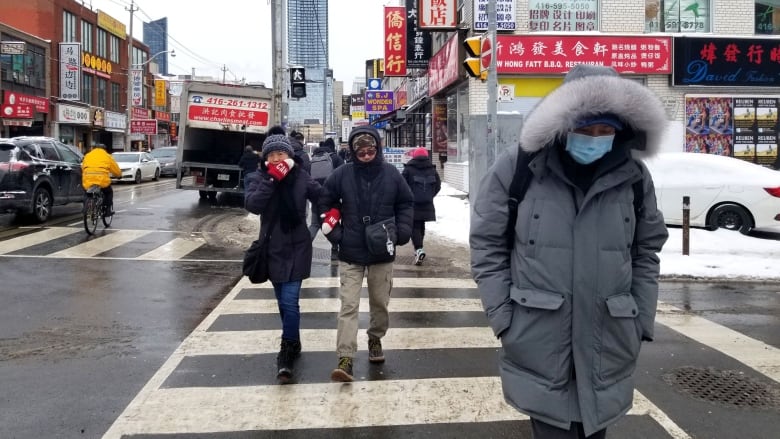Coronavirus outbreak is a reminder of the psychological effect SARS had on my family
CBC journalist recalls personal sacrifices she made during SARS outbreak

"Mom, perhaps, you should consider cancelling your mah-jong game for a few weeks," I said the other night, while chatting with my parents at the dinner table about the coronavirus outbreak.
My parents have a weekly mah-jong gathering at their house with friends every Saturday. It is a traditional game involving four players mixing and drawing tiles to see who can build a winning set first. (If you have watched movies like Crazy Rich Asians or The Joy Luck Club, you will have an idea on what the game is like.)
It sounds paranoid to suggest my parents change their habits because of the new coronavirus. Health officials have said repeatedly the risk of infection remains low in Canada. No one in our family is a frequent traveller to mainland
China.
As a journalist, I know better than anyone that we should make informed decisions, and not react emotionally. But I can't shake the echoes of the SARS outbreak, and the psychological effect it had on me and my family.
Many Canadians will remember the tough battle we fought against SARS, or severe acute respiratory syndrome. But for those of us who have strong ties to Hong Kong, the memory is particularly vivid, painful and alive.
More than one-third of the nearly 800 deaths from SARS worldwide were in Hong Kong. The city was the epicentre of the epidemic. Friends and relatives fed us their experiences and emotions from afar, even before it started hitting hard in Canada.
A tricky assignment
Back then, I was a producer with a Chinese Canadian TV channel in Toronto. The SARS outbreak dominated the news for months. As the story developed, my supervisor gave me a special assignment: to produce a documentary on how the outbreak manifested in the Chinese Canadian community. It meant that I would be interviewing patients and medical staff, as well as visiting hospitals.
Perhaps most importantly, I did not eat with my family. They would leave food on a tray outside the room for me.
My family was concerned when I told them about my assignment. At the time, I was living with my parents, my brother, his wife and their young daughter in the same house. Not only were my parents worried about me, but my niece was a toddler. She could be vulnerable if I were exposed to the virus.
In the end, we reached a compromise. For a few weeks, as I was putting the documentary together, I disinfected my hands, put on a face mask, wore protective footwear and used a medical hair cap before going back into the house every day.
During that time, my parents and I also swapped rooms. I would go straight to their room and use their bathroom.
And, perhaps most importantly, I did not eat with my family. They would leave food on a tray outside the room for me.
I did all this voluntarily. It was a fine balance to continue doing my job while keeping my loved ones psychologically safe.
With the latest coronavirus outbreak, it is déjà vu all over again.
'Cancel your trip'
Almost right after the Hong Kong government declared a coronavirus emergency on Jan. 25, the first day of the Lunar New Year, my phone started ringing and buzzing with messages from friends and family in Canada and Hong Kong.
The main theme was, "cancel your trip."
Yes, I was supposed to be on holiday in my hometown this week. I would have stopped over in South Korea and Vietnam, where there have been confirmed cases, before landing in Hong Kong.
I checked the Canadian government's travel advisory website. It would be my choice to travel.
And on Jan. 26 — 24 hours before boarding a plane — I decided to give up my trip. I made the call only because I did not want my mother to lose sleep.
Little did I know that within days, countries like the U.S., Australia and Singapore would bar travellers from mainland China. Little did I know some airlines would suspend flights to China, including Hong Kong.
Asking for masks
Two weeks later, messages from my hometown continue to pour in. The local government has stepped up and announced that anyone arriving from China — its motherland — will have to spend the next 14 days in quarantine, starting Saturday.

The decision came after tremendous public pressure, as thousands of medical workers went on strike and 1,800 passengers and crew on a cruise ship were put under quarantine.
Besides getting constant news updates, I have also received calls for help, with friends and relatives overseas asking us to send face masks to Hong Kong because of a severe shortage in the city. A friend told me, "asking for masks is worse than begging people to lend you money these days in Hong Kong." The struggle and anxiety is real.
Here in Toronto, the subtle racial stigma of the outbreak can be felt in my day-to-day life. Walking through Chinatown to get my groceries, it seems eerily quieter than it used to be.
Last week, my brother sent me a picture through WhatsApp of a popular Chinese restaurant in Markham, north of the city, during lunch time. His caption said fewer than 10 tables were being used in this typically busy banquet hall. On a more positive note, no one has tried to move away from me on the subway yet.
As for my parents, they have chosen to go on with their lives as usual. The mahjong game is still on every Saturday — at least for now.

